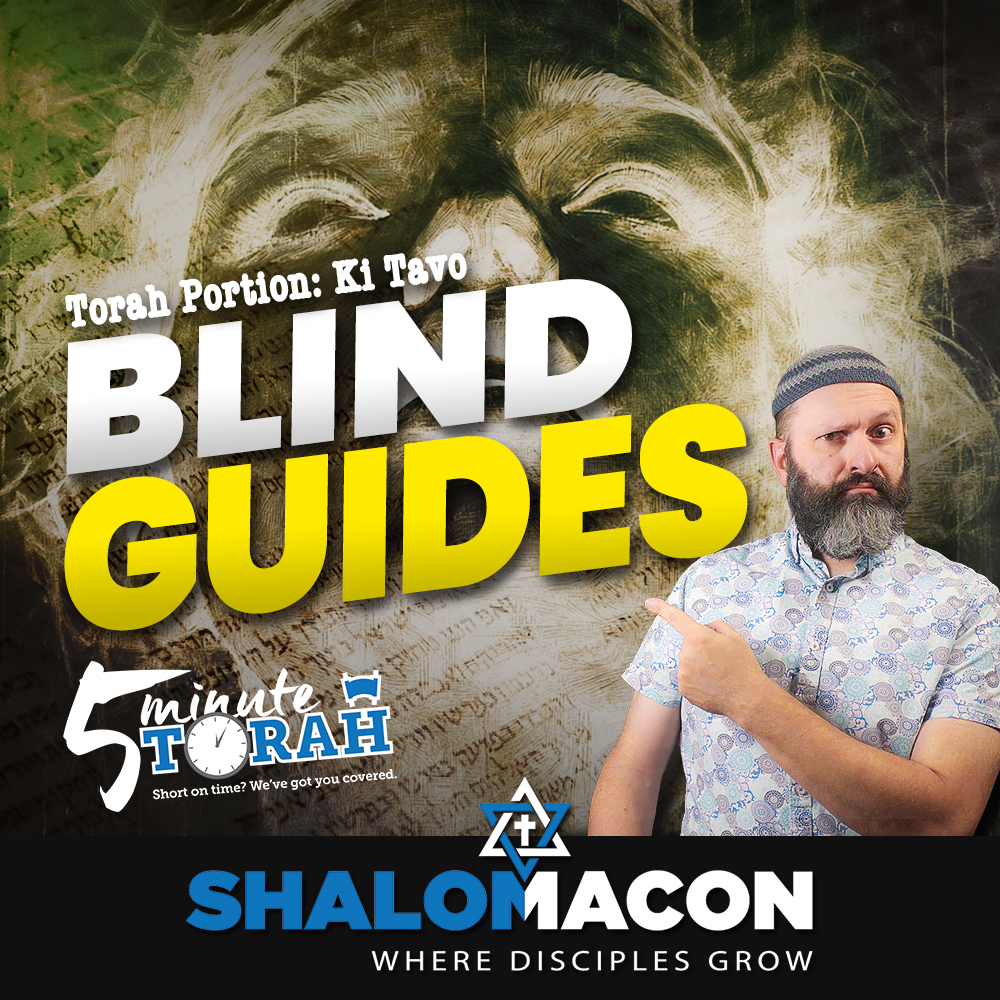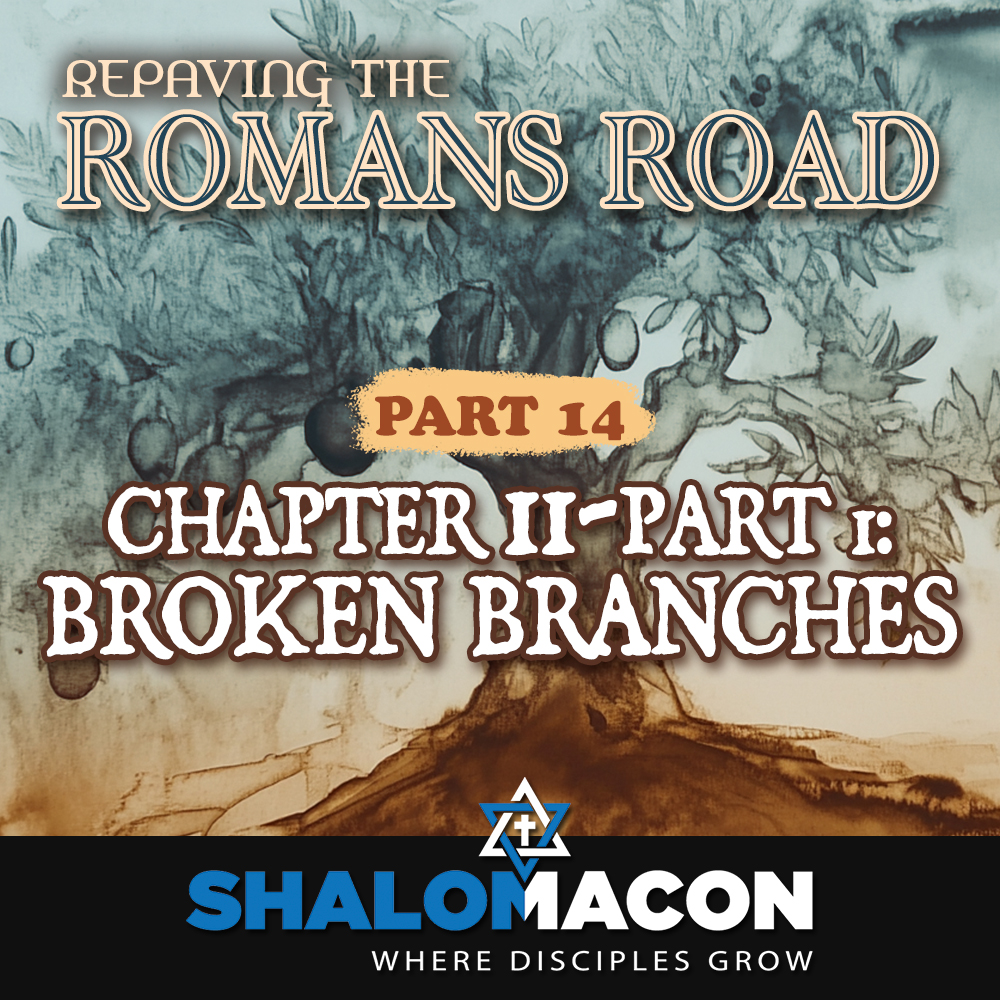[00:00:00] Speaker A: In Matthew 15, Yeshua calls some of the pharisees of his day blind guides. He then followed it up by saying, and if the blind lead the blind, both will fall into a pit. Matthew 1514 but what about you? Have you ever been a blind guide and led someone into a pit without even knowing it? Let's take a look at this idea together in this week's five minute tour.
Shalom and welcome back. I'm Darren and I'm excited to be with you again for another video on the weekly tour portion. Before I get into my five minute Torah commentary, let's take a quick peek into our Torah portion. This week we are studying the portion of Kitavo Deuteronomy 26 129 eight and here are the three things that you need to know about it. Number one, offerings and confessions. Additional info on sacred gifts the beginning of our tour portion contains what seems to be a repeat of the instructions for giving first fruits and tithes. However, there are a few details found here that have not been stated previously, including a liturgical formula that was to be spoken when offering both first fruits and tithes. This declaration includes a confession that God has brought us, the person bringing their offering to the land he had promised, and a guarantee that no part of our offering has been eaten in a state of mourning or uncleanness, nor have we given any of it to the dead. If you are against liturgy, then you might want to reconsider because this prayer of confession is straight from the mouth of God. Number two Gerizim and Ebal blessings and curses Moses instructed the children of Israel to take part in an unusual act once they crossed the Jordan river. Half of the tribes were to go up on top of Mount Gerizim to bless the people. These included the tribes of Shimon, Levi, Judah, Issachar, Joseph, and Benjamin. The other tribes, Reuben, Gad, Asher, Zebulun, Dan, and Naphtali, were to climb Mount Ebal for the curses, and the Levites were to proclaim to all the men of Israel a set of curses upon anyone who would violate the Torahs ethical prohibitions. Together, all the people were to affirm these statements with an amen. Side note the sages tell us that this word amen, alef memnun, is an acronym for the phrase el melech ni'man, God, trustworthy king and number three, back to the future the prophecies of Moses Moses provides a glimpse into the potential future trajectory of the nation. He describes a series of blessings and curses that may come upon them based on either their adherence to or deviation from gods commandments. The Torah consistently teaches that obedience to gods commandments leads to blessings, while disobedience can lead to negative consequences. Through this, Moses provides Israel with a clear understanding of the direct connection between their actions and the unfolding events of their history. He encourages them to choose wisely, reminding them that their choices will shape the destiny of the nation. This concept of divine reward and punishment is an ethical cornerstone in jewish thought, promoting accountability, responsibility and the pursuit of righteousness. If you're looking for a place to learn, connect and grow, then Shalom Macon is the place. It doesn't matter where you are in the world. You can find a connection with Shalom Macon through our live services every Saturday and through our private social network we call Shalom at home. Check us out on YouTube and on our
[email protected], for more information. We look forward to connecting with you and seeing you this Shabbat this week's Torah commentary is called the responsibility of influence and comes from my book five minute Torah, volume two. Harashat Kitavo is so named because of its opening verse, which says, when you come into the land that the Lord your God is giving you for an inheritance and have taken possession of it and live in it. Deuteronomy 26 one the words kitavo mean when you come. Thus this parsha is focused on the responsibility of the children of Israel when they arrive in the land promised to them by the Lord. The first few paragraphs address bringing the bikarim, the firstfruits of the land, to the Lord and the ceremony surrounding this procedure. After this, the Lord gives Israel a reminder of their responsibility as a people who are consecrated to the Lord this day. The Lord your God commands you to do these statutes and rules. You shall therefore be careful to do them with all your heart and with all your soul. You have declared today that the Lord is your God and that you will walk in his ways and keep his statutes and his commandments and his rules, and will obey his voice. Deuteronomy 20 716 17 immediately following this, instructions are given to renew the covenant through a ritual that includes dividing up the tribes and setting them on two mountains, the mountain of blessing, Mount Gerizim and the mount of curses, Mount Ebal. The Levites are to command them from the valley between the two. The ones on Mount Gerizim are to bless the nation, and the ones on Mount Ebal are to repeat a series of curses to which all of the people affirm. Amen. The specific curses recited are listed in verses 15 through 26 two of these, however, are connected in a way that may not be obvious at first. Lets take a look at these two curses and find the link between them. Cursed be anyone who misleads a blind man on the road, and all the people shall say amen. Deuteronomy 20 718 cursed be anyone who does not confirm the words of this law by doing them, and all the people shall say amen. Deuteronomy 27 26 the first verse we can understand in a much broader sense by extending this prohibition to include misleading the spiritually blind. Indeed, our sages teach us that this is the extended meaning of the passage and that we should ever be on our guard against misleading someone who does not have the spiritual capacity to discern our actions. This passage is about leading someone astray. We should not lead a spiritually blind person down the wrong path. The second verse, however, seems to merely be a rebuke against anyone failing to uphold the commandments of the Torah. And how are these two related? Moses ben Nachman, otherwise known as Nachmanides or Rambanjief, understands the phrase anyone who does not confirm the words of this law to apply to anyone who has the ability to influence others to follow the path of Torah but chooses not to. He says that it applies especially to those who are well studied but concerned only about their own spirituality and to those in leadership roles. Rather than simply being a rebuke against failing to observe the Torah's instructions, Ram ban understands this to be a rebuke against passiveness in our responsibility to influence others for the good. Let's face it, leadership is influence. As John Maxwell has said, leaders are held to a higher responsibility because of this. The behavior of a leader influences the behavior of their followers, either positively or negatively. If a person is truly a leader, it doesn't take much effort for them to influence people to take action. They can lead people either to Torah and mitzvot or to a path of destruction. But this is not limited to those who are in the limelight. We are all leading people in one direction or another because we all have some sort of influence. Some of us have a greater influence over people than others. Some of us have an influence over larger numbers of people. But neither the magnitude nor the volume of people we are influencing negates this principle. We have a responsibility to lead the blind on the proper path and uphold the words of the Torah in the eyes of all who see us. We must take this responsibility seriously if we are cognizant of the fact that others are under our influence, either for the good or for the bad, then we should be using that influence to lead people on a path that will bring them closer to their creator rather than pushing them away from him. For most of my life, I've been an influencer in some capacity, but the majority of the time was spent not knowing how to actually lead. I've just loved people and lived a life of faith and devotion, and those simple things have inspired others. What if I'd known how to lead? What's your story? What opportunities have you had to influence or affect others in their faith and practice? And how would you change things now that you know the weight of this responsibility? I would love to hear from you, and others will be blessed to hear what you have to say as well. Drop me a note in the comments below. And last, don't forget to check out our series repaving the Romans road and download the accompanying study guides for each teaching. You can get started by using the link above or at the end of this video. I'll see you next week for another messianic gensai into the eternal Torah of God. Blessings from Shalom Achan, the place where disciples of Yeshua learn, connect, and grow.
[00:08:40] Speaker B: Please visit our website, shalommakin.org, to learn more about us. Join our live services, access other teachings, sign up for our newsletter, join our private network that will connect you with our greater community from around the world, or contribute to the work of Shalom Macon. Thank you for watching and we look forward to connecting with.



